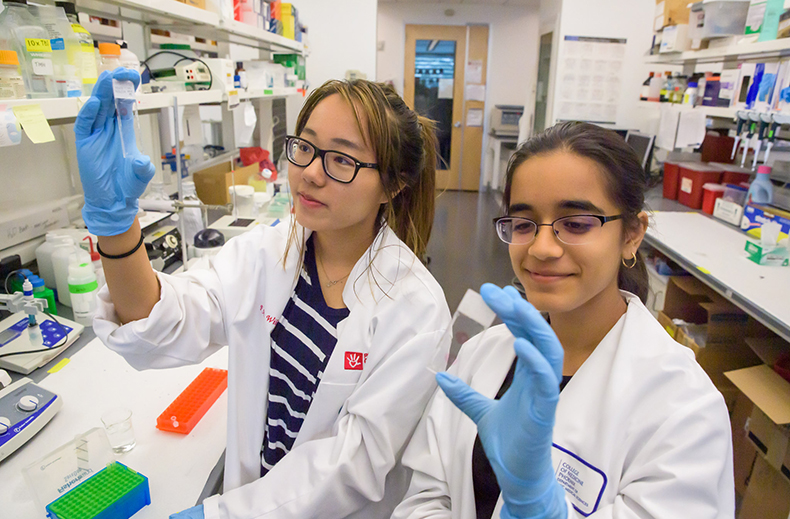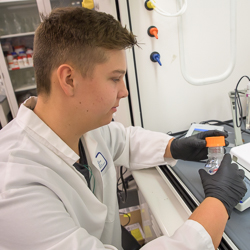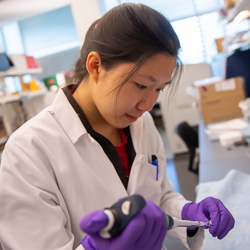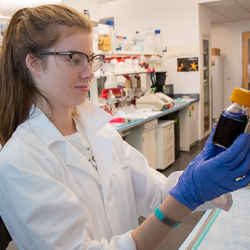
High School Students Spend Summer Researching in UA Phoenix Lab

Twelve Arizona high school students are spending six weeks of their summer vacation conducting research as part of an internship program at the University of Arizona College of Medicine – Phoenix.
The internship, offered through the college’s Department of Basic Medical Sciences, provides students with hands-on research experience, mentorship and allows them to explore future careers in research and medicine.

Lyons was assigned to the laboratory of Rayna Gonzales, PhD, where he is investigating mechanisms associated with ischemic injury in human brain vascular smooth muscle cells. The lab is studying a new class of drugs that targets their own immune and vascular system to help stroke patients regain brain function.
Minseo Kim, a senior at Desert Vista High School in Ahwatukee, is studying fibrosis in the lab of Taben Hale, PhD, a UA scientist who is doing innovative research in preventing heart failure.
“I wanted to join this internship program because it offered real, hands-on experience, rather than reading about it in the textbooks,” she said. “In classes, we have protocols to follow, but we really don’t know what they are for. Here, we have a specific study and we get to learn and understand why we are testing for these things.”
Kim is working with Poulami Soni, a senior from Basis Phoenix.
“This experience has given me a better perspective of everything that research entails,” Soni said. “It has been helpful talking and learning from everyone involved with the program, and I now think research is a career possibility.”
Motivated high school students from diverse backgrounds are selected to participate, and each are assigned a UA College of Medicine – Phoenix faculty member. Students interact with graduate students, postdoctoral associates and faculty at the downtown Phoenix medical school campus. The program is free for students, who are from high schools throughout Arizona.

Now in the program’s fifth year, faculty have mentored a total of 56 high school students. It was started by a committee of four Basic Medical Sciences faculty members: Amelia Gallitano, MD, PhD; Shalini Sharma, PhD; Dr. Hale, and Dr. Gonzales.
“It’s exciting to have the privilege to help guide and train the next generation of future research scientists and health care providers,” said Dr. Gonzales, who directs the program.
Lulu Bi, a senior from Basis Scottsdale, is in the laboratory of Karen Hastings, MD, PhD, studying t-cells and skin cancer. Bi said her favorite part has been learning from Dr. Hastings and the various researchers in the lab.
“I’ve always been interested in research,” Bi said. “I thought this experience would be the perfect intensive opportunity to find out more about research work.”

“I’m interested in neuroscience and neurology,” Hill said. “It has been a great experience getting to see what groundbreaking research is happening. You read about it on the news all the time, but a high school student rarely gets to be a part of it.”
The program concludes with a mini-symposium where students deliver poster presentations describing their research.
About the College
Founded in 2007, the University of Arizona College of Medicine – Phoenix inspires and trains exemplary physicians, scientists and leaders to advance its core missions in education, research, clinical care and service to communities across Arizona. The college’s strength lies in our collaborations and partnerships with clinical affiliates, community organizations and industry sponsors. With our primary affiliate, Banner Health, we are recognized as the premier academic medical center in Phoenix. As an anchor institution of the Phoenix Bioscience Core, the college is home to signature research programs in neurosciences, cardiopulmonary diseases, immunology, informatics and metabolism. These focus areas uniquely position us to drive biomedical research and bolster economic development in the region.
As an urban institution with strong roots in rural and tribal health, the college has graduated more than 1,000 physicians and matriculates 130 students each year. Greater than 60% of matriculating students are from Arizona and many continue training at our GME sponsored residency programs, ultimately pursuing local academic and community-based opportunities. While our traditional four-year program continues to thrive, we will launch our recently approved accelerated three-year medical student curriculum with exclusive focus on primary care. This program is designed to further enhance workforce retention needs across Arizona.
The college has embarked on our strategic plan for 2025 to 2030. Learn more.